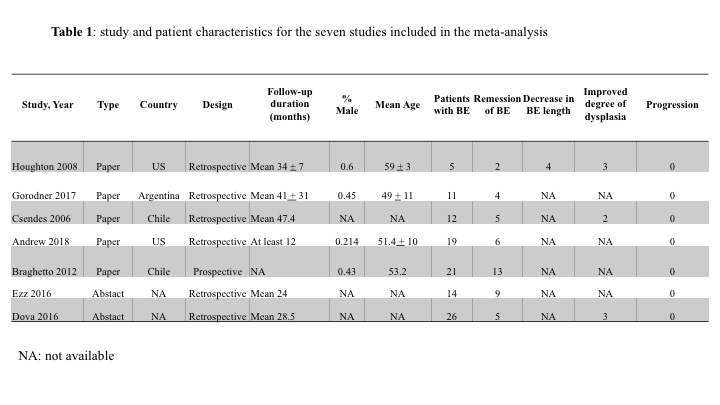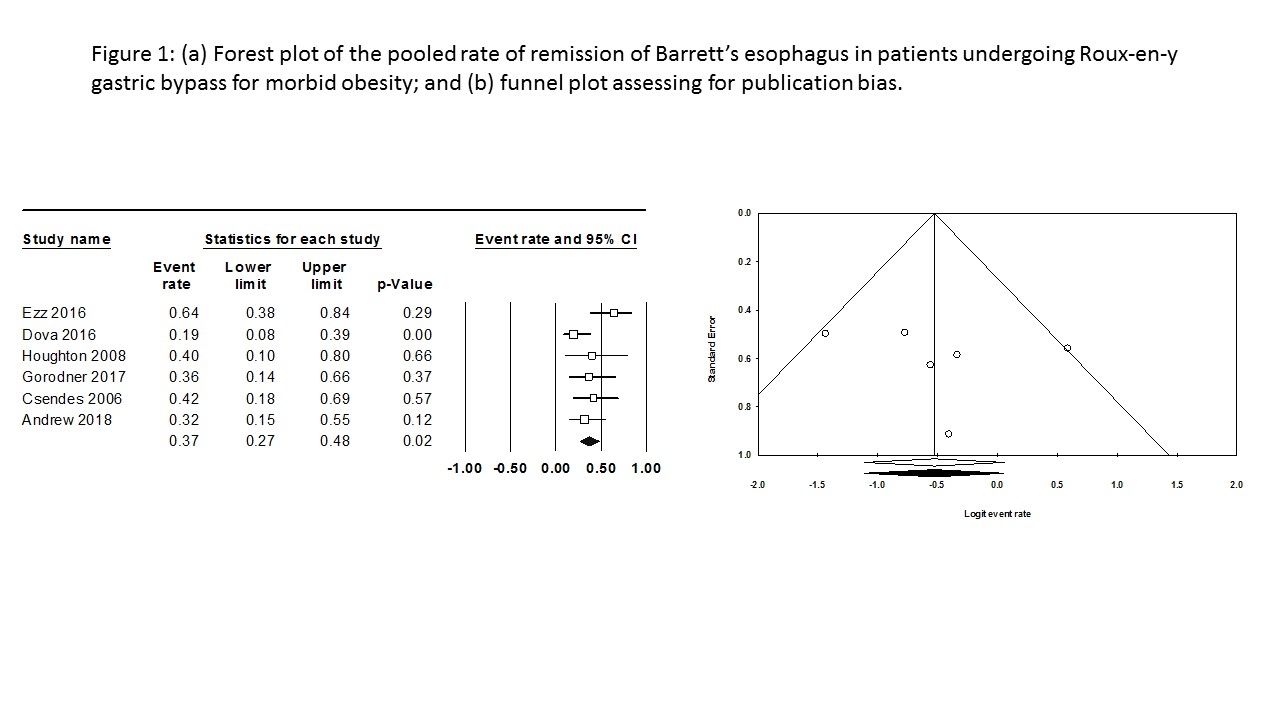HIGH RATES OF REMISSION OF BARRETT'S ESOPHAGUS POST ROUX-EN-Y GASTRIC BYPASS FOR MORBID OBESITY: A SYSTEMATIC REVIEW AND META-ANALYSIS
Bashar J. Qumseya*1, Sherif Gendy2, Alexander Wallace3
1Archbold Medical Group/Florida State University, Tallahassee, FL; 2FAMU, Tallahassee, FL; 3Florida State University, Tallahassee, FL
Introduction: Gastroesophageal reflux disease (GERD) is common in patients with morbid obesity. Both obesity and GERD are major risk factors for Barrett's esophagus (BE). Bariatric surgery has emerged as an effective treatment for morbidly obesity. Roux-en-y gastric bypass (RYGB) is effective in inducing weight loss but can also help eliminate GERD by bypassing most of the stomach. Outcomes in patients with BE who undergo RYGB have not been clearly defined.
Aims: to conduct a systematic review and meta-analysis assessing outcomes in patients with BE who undergo Roux-en-Y gastric bypass (RYGB).
Methods: we conducted a comprehensive literature search using Medline, Web of Science, and Cochrane Library. Last day of search was 11/15/2018. Search results were imported into covidence.org and screened by two independent reviewers. We extracted data on study, authors, publication date, country, type bariatric surgery, number of patients with BE, gender distribution, mean age, mean BMI. The primary outcome of interest was the rate of remission of BE, defined as resolution of all visible BE on follow up endoscopy. We also assessed progression of BE defined as progression in the degree of dysplasia or into esophageal adenocarcinoma. We hypothesized sources of heterogeneity a priori. We assessed heterogeneity using I2andQstatistic. We used standard Forest plots to show prevalence of BE in various studies. Fixed effects models were used when heterogeneity was low (I2<50%). We assessed publication bias using funnel plots and Orwin's fail-safe test. Study quality was assessed using the Down's & Black scale.
Results: our initial search resulted in 536 studies. Of which 35 were reviewed in full text and 7 studies were included in the final analysis. This totaled 108 patients who had BE before bariatric surgery. Two studies were meeting abstracts from the last 3 years, while five studies were published manuscripts. All patients underwent RYGB. Only one study was prospective while the remaining six studies were retrospective in nature. Mean follow-up ranged from 12 to 47 months. Further study and patient characteristics are summarized in Table 1. There was no evidence of heterogeneity with I2=35% and Q=8. Using fixed effect models, the rate of remission in BE was 37% [95%CI: 27- 48%], p=0.02 (Figure 1a). Funnel plot showed low risk of publication bias (Figure 2b). Orwin's fail-safe showed that we needed 85 missing studies to bring the event rate to 10%. None of the studies reported evidence of progression of BE after RYGB.
Discussion: RYGB appears to include remission from BE in a large proportion of patients. There were no reports of disease progression to date. This evidence-based analysis shows that BE is not a contraindication to RYGB in patients with morbid obesity. Instead, this procedure appears to induce disease remission in many patients.

Back to 2019 Posters




